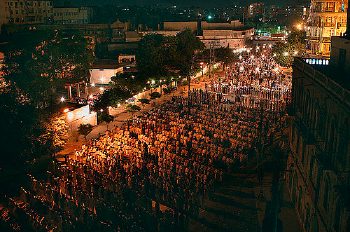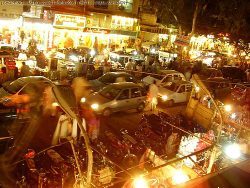My narration below traces back to a recent
Iftar/dinner conversation with a non-Muslim, non-Pakistani friend. She wanted to know how I would spend a
typical Ramzanday in Pakistan. Innocent question, but one that took me on a delightful, and extremely nostalgic, trip down memory lane since I have spent the last 13 Ramzans outside Pakistan.
Simply narrating a typical Ramzan day during high school made me realize what all I have missed for so long now. I narrate here what I told her because I think a few readers may find it interesting, or nostalgic. Most will find it rather ordinary. Maybe that is the point:
I really miss the Ramzan in Pakistan.
I would typically wake up with only about 30 minutes left for theSehri. Damn it. I could never wake up to an alarm clock (still can not) so my mom always had to give me those gentle shoulder nudges that persisted, and came in rapid succession when I would not respond quickly. Us four siblings would form a short queue to brush our teeth before joining the dining table.
The dining table would be all set before the crack of dawn, as though it was just another meal in the middle of the day. How did my mom ever get up so early to have everything prepared in advance? Us siblings preferred fried eggs and malai with paratha, while my father preferred a savory dinner-like meal. We would all eat together, drink our tea, and watch the TV playing in the background.

PTV played plenty of
Hamd and
Naat during the
Sehri transmission. I remember
Qari Waheed Zafir Qasmi,
Khurshid Ahmad,
Umme Habiba,
Saeed Hashmi,
Siddiq Ismail and others. PTV also played lectures on Quran but I think it was typically before I would get up. Now, I am told, it is Liaqat Ali all over Geo at Sehri and Iftar, but Qari Waheed Zafar was the voice that spelled the Ramzan TV transmissions then, including this
naat:
With a few minutes left to the
Fajr Azaan, my mom would make us all brush our teeth again. Then we would sit in the living room and listen to the
Azaans coming via loudspeakers from the four different mosques that existed at walking distance from my home. They all blended into each other but still somehow sounded good. We would pray at home and congregate in front of the TV again. PTV usually showed a
Qawwali on TV post
Sehri, and we would all watch it together. This is how I became a fan of the
Sabri Brothers, and their legendary
“Tajdaar-e-Haramâ€. We really were the children of the 90’s, no? I am told my mother and brother now have cell phones with FM tuners, and they listen to
Naats on their mobile phones!
School bus would arrive and we would pack in. But even the bus rides to school were somewhat special during Ramzan. I often carried atasbeeh (string of beads) with me to continue to pray and avoid the usual political ruckus of finding the best seat on the bus. Our bus-driver, who himself was a Christian and would otherwise put on loud Indian music, would also either stay quiet or play Qawwalis on the bus stereo.

School was the same, but with all of us slower than usual – the lunch breaks were weird: Not only was there no going to the canteen, but all in all it felt like we had 15 minutes in the day with simply nothing to do. The best conversations were around the TV ads related to Eid sales or khusspussi on who was and wasn’t fasting. I am sure many of you will remember TV ads with a squeaky woman’s voice announcing “Billi markaa agar-batti bananey waalon kee taraf sey aap sab ko dilee Eid Mubarakâ€.I always stayed back after school to play football. That never stopped even during the terrible heat of summer Ramzan. We would play for at least an hour or so – in our school uniforms that almost always had patches stitched on where knees had been scratched and bloodied before. Cleats, we didn’t know what they were? We were lucky if we had rubber tennis shoes and not justBata/Service black shoes to play in.
There was obviously no family lunch to come back to home for…but there was lure of a precious cold shower and qailoola (afternoon nap). Ammee would wake me up for Asr prayers and I would quickly run off afterwards to join the mohalla cricket soiree. That was my gang, my pals. We played every evening on the street but Ramzan meant more distractions in the form of fruit-carts and people on cars and bikes trying to make it home before Iftaar. I have this funny image in my memory where I was the wicket keeper continuously moving the empty chair (wicket) out of the way for every passing car. Half of us changed into jeans for the game, but the other half felt more sporty in the shalwar kameez and chappals. I know I was seen playing cricket in that attire more often in Ramzan than otherwise.

Ten fifteen minutes before
Iftaarwe would all hurry home whether the game was over or not. Imagine the yummy smells of frying
samosay,
pakoray, and
namkeen dahee barayentering the nostrils of all of us who had been fasting all day, and were attempting to concentrate on the fast ball for that attempt to hit a sixer into the yard of the school at the end of the street (whose wall was the designated boundary).
Iftaar, I believe, is a feast in everyone’s home no matter how much they earn. It is at least a feast in the eyes and mind of every fasting person. Ammee would cook up a storm that could only be justified by assuming it was a source of pride, joy, and strength for her.
We wouldn’t have
Iftaar on the dining table. Somehow we had developed a ritual of spreading the
Iftar food on a
chaadar, or old newspapers, in the middle of the living room and sitting around it. Sitting on the ground, with all the food before us, and waiting patiently for the
Azaan brought us closer to each other as a family than a table with six chairs could. My favorite item was the
sherbat of the day: it varied between
Rooh Afza,
Naurus,
Lassi, or
finely chopped melon in ice water. That last variety I recently got to taste in the form of
agua fresca at a Mexican restaurant. The food spread had the usual
dates,
pakoray and associated accessories, but the specialty was always the fruit salad and the
chohlay kee chaat.We ate lots at Iftaar so dinner had to wait until quite a while after theMaghrib prayers and the Iftaar. In fact dinner was served, and continues to be served, after the Ishaa prayers for which we joined the congregation in the mosque. Even the mosque had a strange smell of fried pakoray mixed in with Itr (fragrance) during Ramzan.
The time between Maghrib and Ishaa was family TV time, with the8:00pm drama serial occupying everyone’s attention. I somehow remember Ishaa prayers always coinciding with the boringKhabarnama at 9:00 but I am sure it is an aberration in my mind.

During the last ten days of
Ramzanwe would go back to the mosque for the
Shabeena. This is when the congregation tried to hear recitation of the entire
Quran in a few nights of prayers. While I always suffered in school the next day, I have such sweet memories of standing in the open-air (
Shabeena was offered on the rooftop of our non-air conditioned mosque) and listening to
Qir’at(recitation) of the
Quran.
At the last shabeena prayer mithaaiwould be distributed, and earning those two laddoos truly felt like a huge accomplishment.The last ten fifteen days of Ramzan was also when Eid shopping would become a part of the routine. Now that I think about it, I don’t think I really studied much in Ramzan. There was always so much to do, and so much fun to have. Between Iftaar parties, Eid shopping,Shabeena prayers, and staying up to watch the direct telecast prayers from Mecca, we really didn’t have much time left in the evenings which was my usual study time.

Eid shopping was really only for the women in the family, but us guys always got dragged out with them. That said, Eid shopping was fun: it meant being stuck in traffic on Tariq Road in Karachi with songs blaring from each set of four wheels,
qulfi falooda at Sunshine Sweets, lots of
amrood,
jaman or
faalsey from street vendors if it was the season, and plenty of time in brightly lit and 100 degree rooms filled with clothing.
Now when I look back, I remember each day in
Ramzan as a small festival of sorts. When the end of
Ramzan came closer we would feel the pain of parting. We would cry at the
Juma’tul widaa prayers and then again on the night of the 27
th of
Ramzan, and could feel the sadness that it was coming to an end. Yes, our feelings were religiously motivated, but I believe they were also communal. Ramzans have come and gone in the past 13 years, but it has not felt the same. Why? Did religious intensity not transport itself with me when I traveled outside of Pakistan? Maybe only the outwardly expressions of feelings have been muted.
Regardless, I miss
Ramzan in Pakistan. But I still look forward to
Ramzan every year.
(This post was originally published at ATP a few years ago and is being now re-posted.)
































 PTV played plenty of Hamd and Naat during the Sehri transmission. I remember Qari Waheed Zafir Qasmi, Khurshid Ahmad,Umme Habiba, Saeed Hashmi, Siddiq Ismail and others. PTV also played lectures on Quran but I think it was typically before I would get up. Now, I am told, it is Liaqat Ali all over Geo at Sehri and Iftar, but Qari Waheed Zafar was the voice that spelled the Ramzan TV transmissions then, including this naat:
PTV played plenty of Hamd and Naat during the Sehri transmission. I remember Qari Waheed Zafir Qasmi, Khurshid Ahmad,Umme Habiba, Saeed Hashmi, Siddiq Ismail and others. PTV also played lectures on Quran but I think it was typically before I would get up. Now, I am told, it is Liaqat Ali all over Geo at Sehri and Iftar, but Qari Waheed Zafar was the voice that spelled the Ramzan TV transmissions then, including this naat:
 Ten fifteen minutes before Iftaarwe would all hurry home whether the game was over or not. Imagine the yummy smells of frying samosay, pakoray, andnamkeen dahee barayentering the nostrils of all of us who had been fasting all day, and were attempting to concentrate on the fast ball for that attempt to hit a sixer into the yard of the school at the end of the street (whose wall was the designated boundary).
Ten fifteen minutes before Iftaarwe would all hurry home whether the game was over or not. Imagine the yummy smells of frying samosay, pakoray, andnamkeen dahee barayentering the nostrils of all of us who had been fasting all day, and were attempting to concentrate on the fast ball for that attempt to hit a sixer into the yard of the school at the end of the street (whose wall was the designated boundary). During the last ten days of Ramzanwe would go back to the mosque for the Shabeena. This is when the congregation tried to hear recitation of the entireQuran in a few nights of prayers. While I always suffered in school the next day, I have such sweet memories of standing in the open-air (Shabeena was offered on the rooftop of our non-air conditioned mosque) and listening to Qir’at(recitation) of the Quran. At the last shabeena prayer mithaaiwould be distributed, and earning those two laddoos truly felt like a huge accomplishment.
During the last ten days of Ramzanwe would go back to the mosque for the Shabeena. This is when the congregation tried to hear recitation of the entireQuran in a few nights of prayers. While I always suffered in school the next day, I have such sweet memories of standing in the open-air (Shabeena was offered on the rooftop of our non-air conditioned mosque) and listening to Qir’at(recitation) of the Quran. At the last shabeena prayer mithaaiwould be distributed, and earning those two laddoos truly felt like a huge accomplishment. Eid shopping was really only for the women in the family, but us guys always got dragged out with them. That said, Eid shopping was fun: it meant being stuck in traffic on Tariq Road in Karachi with songs blaring from each set of four wheels, qulfi falooda at Sunshine Sweets, lots of amrood, jaman or faalsey from street vendors if it was the season, and plenty of time in brightly lit and 100 degree rooms filled with clothing.
Eid shopping was really only for the women in the family, but us guys always got dragged out with them. That said, Eid shopping was fun: it meant being stuck in traffic on Tariq Road in Karachi with songs blaring from each set of four wheels, qulfi falooda at Sunshine Sweets, lots of amrood, jaman or faalsey from street vendors if it was the season, and plenty of time in brightly lit and 100 degree rooms filled with clothing.
